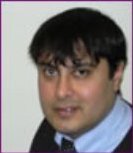Career interview: Financial maths course director

Riaz Ahmad directs and teaches courses on quantitative finance at 7city, a leading training company for the financial services industry. He initially came to study maths because he was "no good at anything else", but he soon found that his degree was a "passport to the world". Plus caught up with him in his office in the City of London.
What do you do exactly and what is the company about?
I joined 7city Learning in October 2003 and I am the course director of the "Certificate of Quantitative Finance" (CQF) - a high level, six month applied program, designed for busy, career-minded, goal-oriented practitioners. The course was designed by Dr Paul Wilmott, a very distinguished and eminent figure in mathematical finance. I am the director of, and oversee, all courses based on mathematical and computational finance, and teach a course on computer programming in C++ for quantitative finance, which I also designed.
In addition to the CQF, 7city Learning provides training for regulatory exams, professional qualifications, product training and graduate and intern training - on both a public and in-house basis. We partner many of the world's prominent financial institutions and, in many instances, our relationships with our clients are international. 7city has training centres in both London and New York and also utilises live webcasting to create a "virtual" classroom experience.
There are a lot of people in the City who are interested in mathematical finance, but who have very rusty maths backgrounds. We therefore run a series of courses covering basic calculus, linear algebra, differential equations and probability, which act as a refresher or primer for the CQF.

Apart from the teaching and designing of courses, I do both old-style academic and more practically based research and some consultancy work for financial institutions. I'm also currently writing a book and numerical and computational methods for derivative pricing, to be published by Wiley, as part of their financial series.
Essentially, my job is a bit like being at University, teaching and doing research, only that it's in the City and that I'm working with finance practitioners.What kind of maths do you do?
Everything is of course geared towards mathematical finance, especially derivative pricing. Essentially, derivatives are ways of reducing risk. A derivative is a financial contract which derives its value from an underlying asset. There is a wide class of financial assets, including equities (London, Tokyo), indices (FTSE 100, DJIA) and commodities (metals, energy). An option is an example of a derivative.
Let me give you an example to illustrate how an option works: imagine you'd like to sell your house in, say, a year's time. Of course you don't know what the market will be doing during that period, and you want to be sure that you'll achieve at least the current value of the house, let's say £100,000. Now suppose I come along and am interested in buying the house in a year's time. I want to be sure that I don't pay much more than its current value. I can enter into a contract with you, which is called an option, which stipulates that on a specified date in a year's time, I can buy the house for £100,000 if I choose to. For this contract (which derives its value from the price of the house), I pay you a fee, called the option price, say £100. I am essentially paying you for allowing me the privilege of locking in at today's price. I thus have the option of buying your house if I so choose, in which case you then have an obligation to sell me the house. If I decide not to exercise this right, that is perfectly fine, as the choice is mine - you will still keep the £100 fee which is paid at the time we enter into the contract.

Buying a house? Ask Riaz!
This is an example of a European call option, where nothing is done before the year is up. Another example is an American option, where I can buy at any time before the 12 month period is over, and then there are other variants such as the Asian option, where the option price is based upon the price of the house, averaged over the time period involved. The latter is an example of an exotic option. There are new types of options coming out almost every fortnight, it's an extremely dynamic area.
The big question is, how much should the option price be? And if I decide to sell the option I bought from you to someone else in 6 months' time, how much will it be worth then? The great advance in this area, which triggered an explosion in mathematical finance, came in 1973, when Fischer Black, Myron Scholes and Robert Merton developed an equation which models derivative prices. They captured exactly how the price of an option should depend on various factors. In our example above, two obvious factors are the current price of the house and time - the shorter the period involved, the less the option is worth, and it will be worth absolutely nothing once the period is up. In its most basic form, the Black-Scholes equation is a differential equation with the two variables stock price and time, whose solution will be the option price.
But with all the various types of options that are around, the maths involved gets extremely sophisticated. Other factors, such as interest rates or volatility - the standard deviation of the change of value of the asset - have to be taken into account. It was with the invention of the Black-Scholes equation, and its solution, that financial maths really took off, and Merton and Scholes (Black had died in 1995) received the 1997 Nobel Price for Economics for it.
Although mathematical finance is a relatively young subject, the complexity and sophistication involved has turned it into a major discipline within mathematics. People from all branches of mathematics, physics, engineering and economics are coming into mathematical finance, bringing with them their own area of expertise. I, for example, did a PhD in fluid dynamics. The kind of methods that people have been using for many years in this classical branch of applied mathematics are now being used in mathematical finance. Books on the subject are coming onto the market constantly, and the numbers are still growing.
This is why mathematical finance is a very difficult subject to teach yourself, and why many people seek help in the kind of courses we offer. Universities, also, are starting to set up one-year Masters courses on the subject, and there's a lot of scope for PhD projects. I'm confident to say that this level of interest is likely to continue. I don't think it's like IT, where the bubble finally burst. Whether you call it mathematical finance, quantitative mathematics or financial mathematics, it's a hard-core maths subject.
What made you decide to study maths at university, and how did your career move on from there?
Well, if you want an honest answer, I decided to study maths at university because I felt that I was no good at anything else. I didn't like the practical aspects of the science subjects I did at A level, and found that maths involves a lot less effort. Being good at maths doesn't depend on how much you read or how much you actually work. If you've got an affinity for it, all you need is a pen and paper and you're away.I really liked the abstract nature of maths: dy/dx means the same thing whether you're in London, Beijing or South America. Maths is a universal tool which is not influenced by culture or context.
When I started doing a BSc in mathematics at King's College, London, in 1987, I soon found that I had made the right decision. I really liked the way that maths was being taught from scratch. You couldn't just differentiate $x^n$ by pulling down the $n$ and subtracting 1 from the exponent. Everything had to be justified and proved, working from first principles: nothing was taken for granted. In a sense, you had to forget everything you knew from A level and start again. It's a shock at first, but you soon see the advantages. Even mechanics courses were unlike school maths - all the problems we solved were in terms of vector differential equations.
This self-contained and rigorous way of teaching is very different from the way maths is taught to physicists and engineers, for example. Many people on our courses, including theoretical physicists, tell me that they wish they had done maths at university to really understand the underlying principles. If I had another chance to go back to school and do it all again, I'd definitely still do maths at university.

What goes on in an artery?
After my BSc I did an MSc in applied maths at Imperial College in London, and then went on to a PhD in fluid dynamics at University College London.
Between my MSc and my PhD I went through a phase in which I became interested in blood flow and arterial disease. In my Masters I had done some courses on fluid dynamics and had come into contact with Professor Frank Smith FRS, who is one of the biggest names in a branch of fluid dynamics called boundary layer theory.
Fluid dynamics is the study of how fluids flow through internal geometries, such as pipes, and around obstacles, such as aircraft wings and mountain ranges. I was really inspired by Frank and decided to try and do a PhD with him. It was a case of "either I work with him or I go and get a job outside university", and I was lucky as he accepted me as his PhD student.
For my thesis, I looked at the way liquids flow through differently shaped pipes or tubes. The motivation and interest for this study was the role of blood flow in the initiation of vascular disease, i.e. atherosclerosis. During the course of my PhD I had a clinical attachment with a consultant vascular surgeon at University College Hospital, which gave me an invaluable insight into the potential clinical application of my research.My PhD thesis was a mixture of theoretical and numerical work. I spent a lot of time crunching numbers on a Sun workstation. The kind of problems you encounter in modern applied maths can't be done by hand. They all require a certain amount of numerical computation. In my case, the underlying geometry of the pipes was very complicated, the system got very messy, and even more numerical computing was needed.
We also looked at what happens to flows near the entrance of a pipe, which required different equations, and towards the end I developed some equations of motion for flows through a general shaped pipe, which could be constricted, dilated or have bifurcations. The whole thing became extremely complicated and fortunately my supervisor decided that it could be a good starting point for someone else's PhD - a very welcome decision!
At the time of my PhD, I never envisaged that I would be working in financial maths one day, I didn't even know that such a subject area existed. But it turns out that what I have learned in writing my thesis is just what I need for the kind of things I do now. Fluid mechanics throws up the most complicated partial differential equations known. Differential equations come up whenever you look at systems that are continually changing, and of course financial markets do just that. I gained invaluable expertise, and looking back, I certainly would not change the area I did my PhD in. I still think that fluid dynamics is the most interesting and challenging branch of maths and I don't think that I could have gained the level of mathematical proficiency I need to do my current work anywhere but in applied maths.
After my PhD, I started a position at Imperial College, which was funded by the research arm of the Ministry of Defence, DERA as it was called then. I got into this almost by chance - when I came to the end of the PhD I realised that I was going to have to get a job. I saw the ad in the Guardian newspaper, applied without many expectations, but promptly got the job.

What's going on under the sea?
After Imperial I went to Lahore University of Management Sciences in Pakistan (LUMS), where I held an assistant professorship. They were starting up a new maths department there, and I went along and taught maths at undergraduate and postgraduate level. I taught a variety of courses in applied maths and mathematical methods - basically the kind of maths I like. I've never really got on well with abstract algebra: groups, rings, fields and that kind of stuff. To this day, I don't think I understand what a group is.
It was after the spell in Lahore that I finally got into maths finance through an academic position at Oxford University. They were starting a new MSc in mathematical finance, and my task was a combination of teaching on that, research and also looking after the administration of the course. The mathematical finance group at Oxford was initially set up by Paul Wilmott, who also designed their postgraduate course in maths finance (and subsequently courses here at 7city). I had worked with him briefly on a previous occasion, and that whet my appetite for the subject.
What, apart from financial rewards, made you move from academia into the "real world"?
This is my first job outside academia. I was a bit apprehensive about coming here at first, but now I can say that I definitely made the right move. The main reason for leaving the job in Oxford and coming here was the opportunity to work full-time with Paul Wilmott, but I also felt that working in such an applied area of maths - mathematical finance and derivatives - meant that I really had to go and see what it was like "outside". Since coming here, I have had the opportunity to do consultancy work, something that I would never have been able to do at university. When I started this job, I said to a friend who is in banking that I would come back to academia in a few years' time. He said: "no, you won't", and he was right: I'm sure that I will stick to this line of work in the future.
I go to LUMS regularly as a visiting faculty member, at both their graduate business school and executive development centre, where I teach derivatives on their MBA program. In addition I have designed and teach continuous professional development courses in derivatives to finance practitioners employed by banks and finance regulatory bodies in Pakistan.
Looking back over your varied career, what is the single thing about maths that fascinates you?
It's the universal nature of maths. If you look around, everyone is now using maths to solve problems. Even university departments that do political or social sciences are now advertising for mathematicians to help them with quantitative models. After all these years in which people have been using maths to solve very complex scientific and engineering problems, it has finally dawned on them that maths could help them with comparatively simple problems. To find out how people vote, think or feel about certain subjects, or how they behave or will behave in the future, you have to devise tests and models that give you accurate and meaningful information and statistics, and this is a job for a mathematician.
An economist once complained to me: "it's not fair, whenever I open an economics journal it's all mathematics!" I think it's true to say that mathematics has hijacked everything. Certainly for mathematicians this is very good news - you can use maths in almost everything. Say, for example you have a problem in finance. You can give it to a mathematician who knows nothing about finance, and tell him or her: "$V$ is the option price, $r$ is the interest rate, and $s$ is the volatility. Can you solve the equation for me and interpret it ?" That mathematician will not only solve the equation for you, but also tell you what happens to $V$ as the volatility increases, or the interest rate decreases. And all that without knowing any of the underlying finance! You can put a mathematician in any setting, and explain them a little about the economics, or physics or whatever is involved, and they can work out the problem for you and interpret the solution in a real-world sense.

Finance needs maths
Certainly when banks take on new quantitative analysts, they favour mathematicians and the expertise that comes with them. They'll look at your background and say: "is there anything in that person's work that we could apply to our problems?". The basis for modern financial maths, in particular derivatives, is the evolution of financial assets and its inherent uncertainty, and there are many areas within maths that can contribute new ideas for research.
Maths is like a global passport in terms of careers. Without a doubt, the future for applied mathematicians looks very, very good. To anyone who is doing maths at school and enjoys it I would definitely recommend to do maths at university, regardless of whether they want to become a professional mathematician or not. If you want to do a joint degree, consider taking maths as one of your subjects. I always say that maths is like the colour black - it goes well with everything. Whether it's maths and computing, or maths and physics, or even maths and a modern language, if you go along to an employer with that analytical background that comes with a maths degree, you're going to be a very attractive proposition.
About the author
Marianne Freiberger is acting editor of Plus.